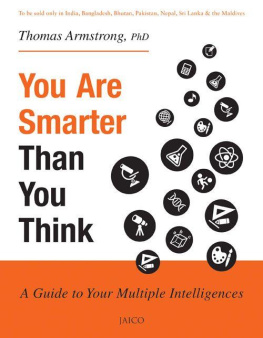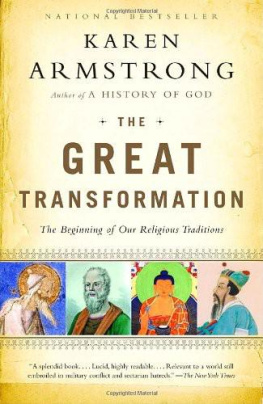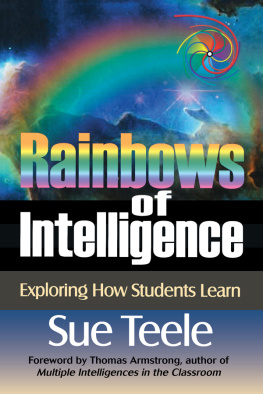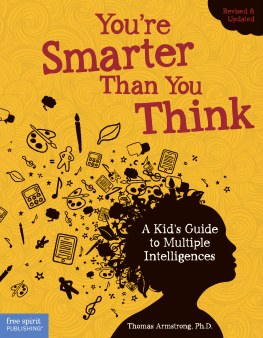Armstrong - You Are Smarter than You Think
Here you can read online Armstrong - You Are Smarter than You Think full text of the book (entire story) in english for free. Download pdf and epub, get meaning, cover and reviews about this ebook. year: 2015, genre: Children. Description of the work, (preface) as well as reviews are available. Best literature library LitArk.com created for fans of good reading and offers a wide selection of genres:
Romance novel
Science fiction
Adventure
Detective
Science
History
Home and family
Prose
Art
Politics
Computer
Non-fiction
Religion
Business
Children
Humor
Choose a favorite category and find really read worthwhile books. Enjoy immersion in the world of imagination, feel the emotions of the characters or learn something new for yourself, make an fascinating discovery.
You Are Smarter than You Think: summary, description and annotation
We offer to read an annotation, description, summary or preface (depends on what the author of the book "You Are Smarter than You Think" wrote himself). If you haven't found the necessary information about the book — write in the comments, we will try to find it.
Armstrong: author's other books
Who wrote You Are Smarter than You Think? Find out the surname, the name of the author of the book and a list of all author's works by series.
You Are Smarter than You Think — read online for free the complete book (whole text) full work
Below is the text of the book, divided by pages. System saving the place of the last page read, allows you to conveniently read the book "You Are Smarter than You Think" online for free, without having to search again every time where you left off. Put a bookmark, and you can go to the page where you finished reading at any time.
Font size:
Interval:
Bookmark:


Published by Jaico Publishing House
A-2 Jash Chambers, 7-A Sir Phirozshah Mehta Road
Fort, Mumbai - 400 001
www.jaicobooks.com
Text copyright 2014, 2003 by Thomas Armstrong, Ph.D.
Illustrations copyright 2014, 2003 by Free Spirit Publishing Inc.
Illustrations by Carolina Arentsen and Marieka Heinlen
Published in arrangement with
Free Spirit Publishing Inc.
Minneapolis, MN
(612) 338-2068
To be sold only in India, Bangladesh, Bhutan,
Pakistan, Nepal, Sri Lanka and the Maldives.
YOU ARE SMARTER THAN YOU THINK
ISBN 978-81-8495-777-8
First Jaico Impression: 2015
All rights reserved under International and Pan-American Copyright Conventions.
No part of this book may be reproduced or utilized in any form or by any means, electronic or mechanical including photocopying, recording or by any information storage and retrieval system, without permission in writing from the publishers.
Dedication
To my sister, Jane
Acknowledgments
Id like to thank KaTrina Wentzel for using her People Smarts to get in touch with me about doing this book for Free Spirit; Jennifer Brannen and Darsi Dreyer, for their Word Smart skills in doing such a great job of editing the text; Marieka Heinlen and Carolina Arentsen, for using their Picture Smarts to create wonderful images for the book; and Judy Galbraith for her Self Smart vision in creating a publishing company to empower kids in school and in life. Finally, Id like to thank Dr. Howard Gardner, whose work in multiple intelligences has helped millions of kids worldwide realize how smart they really are!
Introduction
Why Youre Smarter Than You Think
Do you think youre smart? What does it mean to be smart anyway? Many people believe being smart is all about getting good grades and high test scores in school. Lots of people think being smart means you can do things like:
- read really well
- solve math problems quickly
- recite a bunch of facts
- understand everything about computers
So, what do you think being smart means?
Heres something that may surprise you: Being smart isnt only about getting good grades, scoring well on tests, and memorizing stuff. In fact, there are lots of other ways to show your smartsthrough art, music, athletics, nature, emotions, and getting along with others (to name a few). In this book, youll discover that there are many ways to be smart.
For about the past 100 years, experts have often used IQ tests to figure out how smart people are. IQ stands for intelligence quotient, and it is a measure of how someone scores on the test. The test has you solve math problems, define words, create designs, repeat numbers from memory, and do other tasks. Maybe youve taken an IQ test.
Many people think that IQ tests are the best way to measure how smart someone is. IQ tests arent perfect though, and theres a lot they cant tell you. They cant predict what youll do when you grow up or what you can achieve in your life. And the test questions may reflect the biases, or opinions, of the people who created them. Besides, no test can test for everything. The questions dont always give you the best chance to show off your different kinds of smarts. IQ tests generally focus most of their attention on being good with words or numbers, and they neglect other important things like music, art, nature, and social ability.
Recently, people have challenged the idea that IQ is the best measure of intelligence. One of those people is a psychologist and a professor of education from Harvard University named Dr. Howard Gardner. Thanks in part to his work, experts now have a whole new idea of what it means to be smart.
The Theory of Multiple Intelligences
Since IQ tests are limited and dont test for the wide range of abilities that people often show and use, Dr. Gardner suggests they arent a true measure of how smart someone really is.
Dr. Gardner decided there isnt just one way to be smart but rather many different ways. He used his research with kids and adults to discover more about how people learn. Dr. Gardner found out that people seemed to learn and show their smarts in a lot of ways. He also noticed that different parts of the brain seemed to be tied to the different ways of being smart. He came up with an idea, or theory, to explain the wide range of abilities he was seeing. He called his idea the Theory of Multiple Intelligences (or MI theory for short).
If you think about it, Dr. Gardners idea about different kinds of intelligence makes sense. There are plenty of examples of people who havent scored well on IQ tests or who havent even been tested on what theyre good at doing, but who are clearly very smart in many other ways. These might include people who paint, climb mountains, make business deals, explore nature, or invent machines. Certainly, you can score well on an IQ test and still do those things, but your test results wont necessarily show everything that youre good at.
MI theory says there are eight (and maybe nine) different kinds of intelligenceeight or nine ways to be smart! (There may even be more, but they havent been identified yet.) Each of these different kinds of intelligence can be described by certain traits, activities, and interests.
When Dr. Gardner published books about his theory, he came up with names for the different kinds of intelligences. Here are the eight kinds of smart he talked about:(1) Linguistic Intelligence, (2)Musical Intelligence, (3)Logical-Mathematical Intelligence, (4)Spatial Intelligence, (5)Bodily-Kinesthetic Intelligence, (6)Interpersonal Intelligence, (7)Intrapersonal Intelligence, and (8)Naturalist Intelligence. There also may be a ninth intelligence called Existential Intelligence or Life Smart (well talk about it in the last chapter of this book, see page 174).
Ive been studying Dr. Gardners work for over 25 years now. Over the years, Ive written many books for adults on multiple intelligences. But because Ive also spent many years teaching kids, I wanted to write a book that would help young people. I hope to explain MI theory in a way that makes it easy for you to understand, because I think its important for kids like you to make the most of all your smarts.
To make things easier, Ive created some simpler language to describe the nine intelligences:
 | Word Smart (Linguistic Intelligence): You like words and how theyre used in reading, writing, or speaking. You may enjoy word play and word games, foreign languages, storytelling, spelling, creative writing, or reading. For more about this intelligence, see Chapter 1. |
 | Music Smart (Musical Intelligence): You appreciate music, rhythm, melody, and patterns in sounds. You are capable of hearing tone and pitch. You may appreciate many different kinds of music and enjoy activities like singing, playing instruments, listening to music, or attending concerts. For more about this intelligence, see Chapter 2. |
 | Logic Smart (Logical-Mathematical Intelligence): You enjoy figuring things out and may understand numbers and math concepts, like finding patterns, and have fun with science. You may like riddles, brain teasers, computers, creating your own codes, or doing science experiments. For more about this intelligence, see Chapter 3. |
Font size:
Interval:
Bookmark:
Similar books «You Are Smarter than You Think»
Look at similar books to You Are Smarter than You Think. We have selected literature similar in name and meaning in the hope of providing readers with more options to find new, interesting, not yet read works.
Discussion, reviews of the book You Are Smarter than You Think and just readers' own opinions. Leave your comments, write what you think about the work, its meaning or the main characters. Specify what exactly you liked and what you didn't like, and why you think so.













